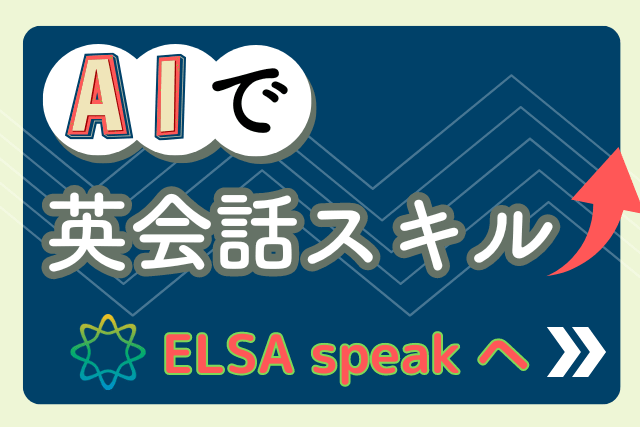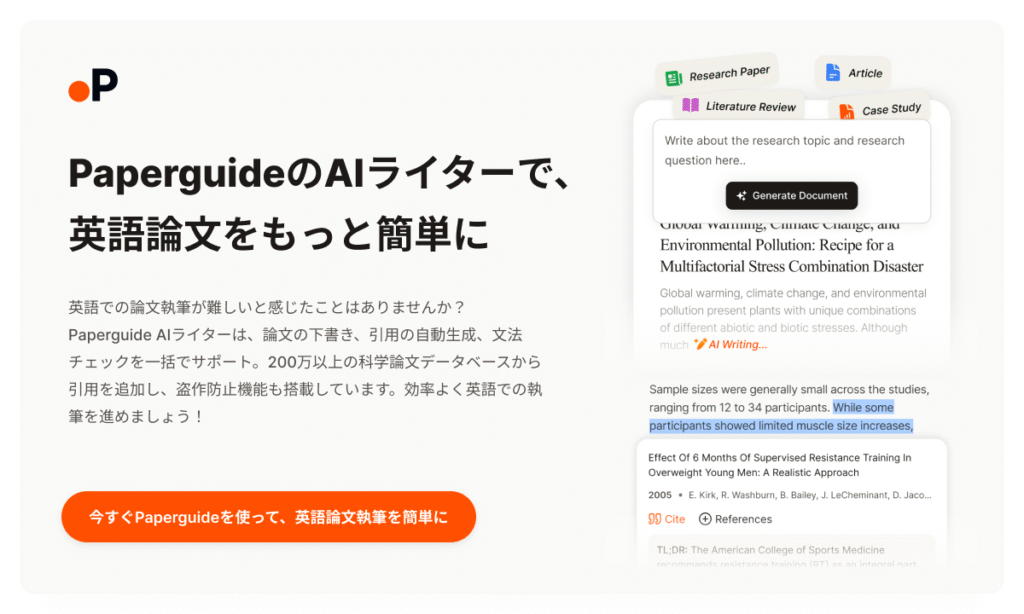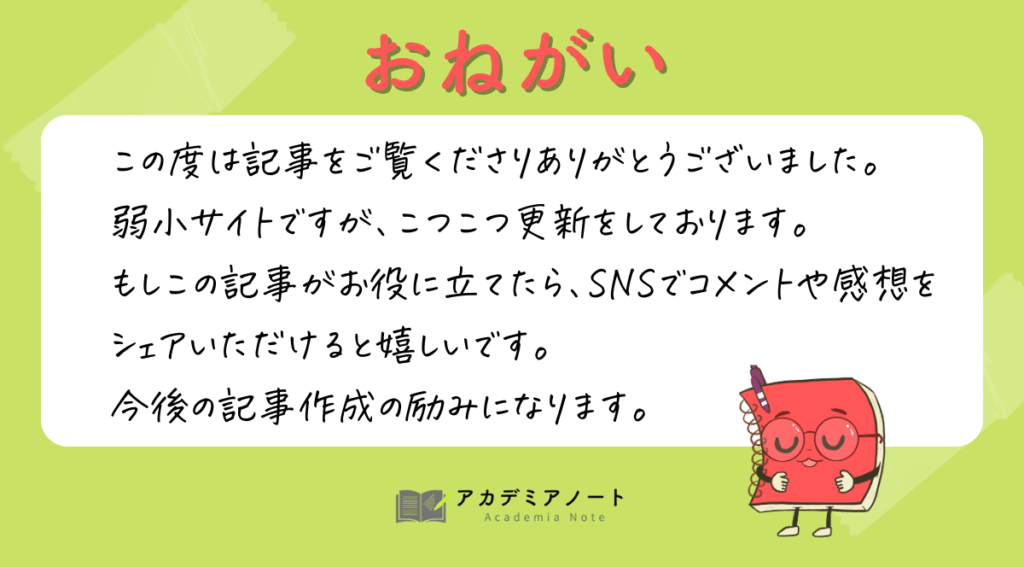Postdoctoral problem in Japan
What is the postdoctoral fellow problem in Japan?
It is about the present situation that many PhDs have been unable to find the position which has no term (permanent or tenure-track positions), and have become postdoctoral fellows with unstable employment conditions and salaries for a long time.
We often hear this kind of story among universities and researchers in Japan.

If you advance to PhD, it becomes harder to find a job.

Postdoctoral fellow’s salaries are low, and the future of researchers is unstable.
In Japan, the fact that young researchers are facing a difficult situation is considered as problem, and in recent years, the government has finally begun to take action to this problem.
In this article, I will delve into the employment situation and salaries of PhD graduates in Japan, introducing the latest statistical data as much as possible.
\The main points of this article are as follows/
- Employment situation of Doctoral graduates
- Reasons of the postdoctoral fellow problem
- Postdoctoral fellow’s salary
You can read from anywhere you like when you click the section.
This is a long article, so please read from the section you want to read.
What is a postdoctoral fellow in Japan?
“postdoctoral fellow” refers to a researcher (or the post itself) who has taken a fixed-term position after obtaining a doctoral degree.
In today’s Japanese academic world, there is a shortage of university faculty positions, and postdoctoral fellows are increasingly being positioned as a training period that all researchers go through.
As they accumulate research achievements, they look for permanent jobs that have no fixed term.
Characteristics of postdoctoral fellows in Japan:
- A fixed-term position
- Self-improvement while working under the research supervisor (PI)
- Lower salary compared to peers of the same age
Characteristics of postdoctoral fellows in Japan #1: Fixed-term employment
Postdoctoral fellows in Japan are often hired for a period of around 1-5 years. This is because the funding sources for their employment, such as competitive research grants, typically have a fixed term.
It is common for research projects to hire them after receiving a large research grant, in order to further advance the research. However, if the project ends and the research grant runs out, the their employment may also be terminated.
Depending on the results and progress of the project, it is possible to renew the contract and work for a longer period than the initial contract term. In some cases, postdoctoral fellows may also work for an extended period by repeatedly renewing their contract, if the funding source comes from the research laboratory’s basic research budget.
Characteristics of postdoctoral fellows #2: Working under a Research Supervisor (PI)
Postdoctoral fellows work under the research supervisor (PI) who employs them and do not have their own research labs.
There are various situations in which postdoctoral fellows work, including:
- When they are assigned to specific research projects
- When they are given relatively more freedom to conduct research within a certain field
- When they are required to assist with university education
Exceptionally, postdoctoral fellows who are awarded special fellowships from JSPS are often given greater freedom in their research under their host researcher.
Characteristics of postdoctoral fellows #3: They receive lower salaries compared to other professionals of the same age.
I will explain this in detail below. “Postdoc Salaries.”
While it varies depending on the hiring conditions, postdocs are said to earn an annual salary of between 3-6 million yen.
From my search on JrecIn, I found the following conditions:
- Annual salary of 2.5-5 million yen on a yearly contract basis.
- Hourly rates of 1,500-2,500 yen on an hourly contract basis.
Some work full-time while others work part-time, such as two to three days a week, resulting in significant variability in annual income.
Because their salaries alone are often insufficient to live on, many also work as part-time lecturers or in other jobs.
Even if they obtain a doctoral degree directly from a university or graduate school, they are around 28 years old. Therefore, it can be said that compared to others their age in the workforce, postdoctoral fellows receive lower salaries.
What is the postdoctoral fellow problem in Japan?
It is estimated that there are currently more than 1.5 million postdoctoral fellows in Japan who have not been able to find a regular position after completing their PhD.
 あかのん
あかのんthere are a lot of researchers who cannot find a stable job with a doctoral degree.
The reasons for the increase in the number of postdoctoral fellows are as follows.
- The number of PhDs has increased considerably in the last half century
- There are not enough university faculty posts for the number of PhDs.
- The culture of working for companies after obtaining a doctoral degree is not widespread
In the first place, postdoctoral fellows were created to fill the shortage of university faculty positions. The postdoctoral fellowship was positioned as a “training period” and a career path before obtaining a position in academia, with the aim of increasing the number of researchers themselves.
However, many young people find it difficult to get out of the unstable post-doctoral positions and the treatment is not good, which are called the “postdoctoral fellow problem”.
In Japan today, it is said that these postdoctoral fellow problems have “reduced the attractiveness of scientists” and that highly capable students are no longer aiming to become scientists.
Severe Employment Situation for PhD.
The Ministry of Education, Culture, Sports, Science and Technology (MEXT) conducted a survey of doctoral graduates in 2020, and the results are as follows.
- Doctoral course graduates: 15522 persons
- Of these, 75.8% were employed
- Of those who found employment, 69.3% (52.6% of the total) were employed as a permanent basis.
\Click the image to enlarge/
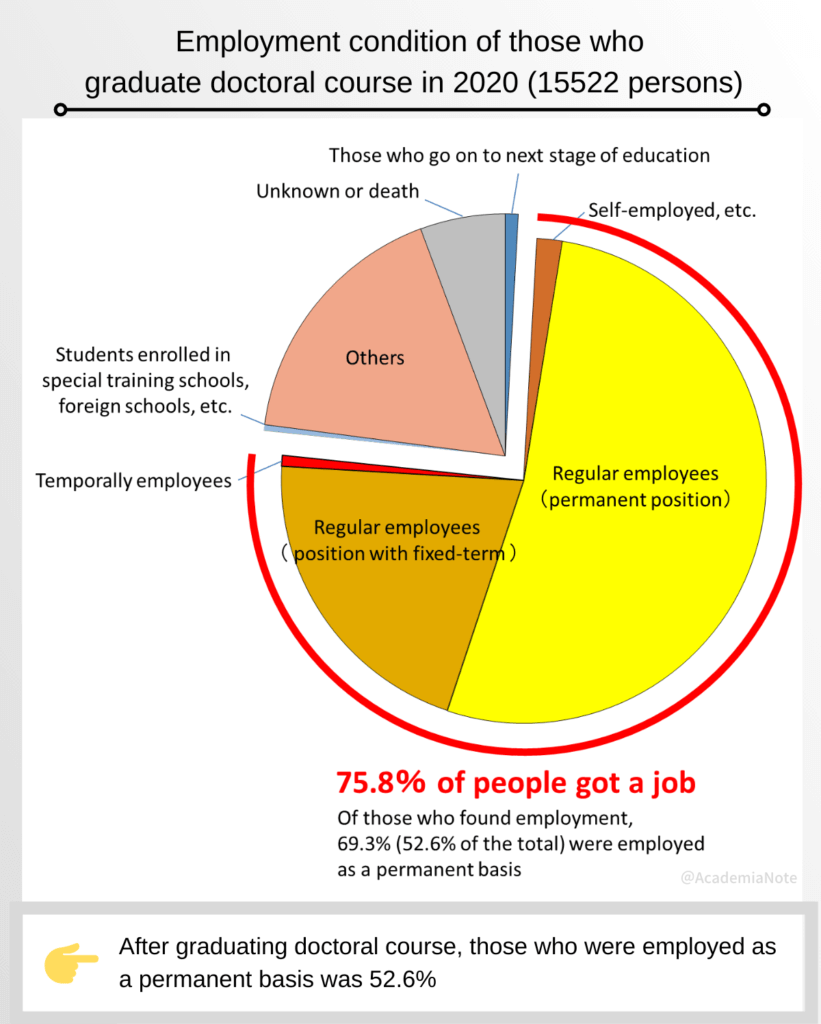
Created using Canva Pro
In contrast, 74.1% of master’s degree graduates are employed on a permanent basis (source: MEXT).
 あかのん
あかのん52.5% for PhD.
74.1% for master’s degree
The employment rate is tougher for PhD graduates!
Why is it so difficult to find stable employment?
Reason for difficulty in finding job ① : Highly competitive university faculty posts
If you aim to become a researcher after obtaining a doctorate, you will be looking for a post as a university faculty member or in a research institute.
However, those university faculty posts are very competitive.
The reason for this is the small number of posts relative to the number of PhD.
The number of PhDs has increased significantly in half a century
The number of PhDs has more than doubled since the 1980s.
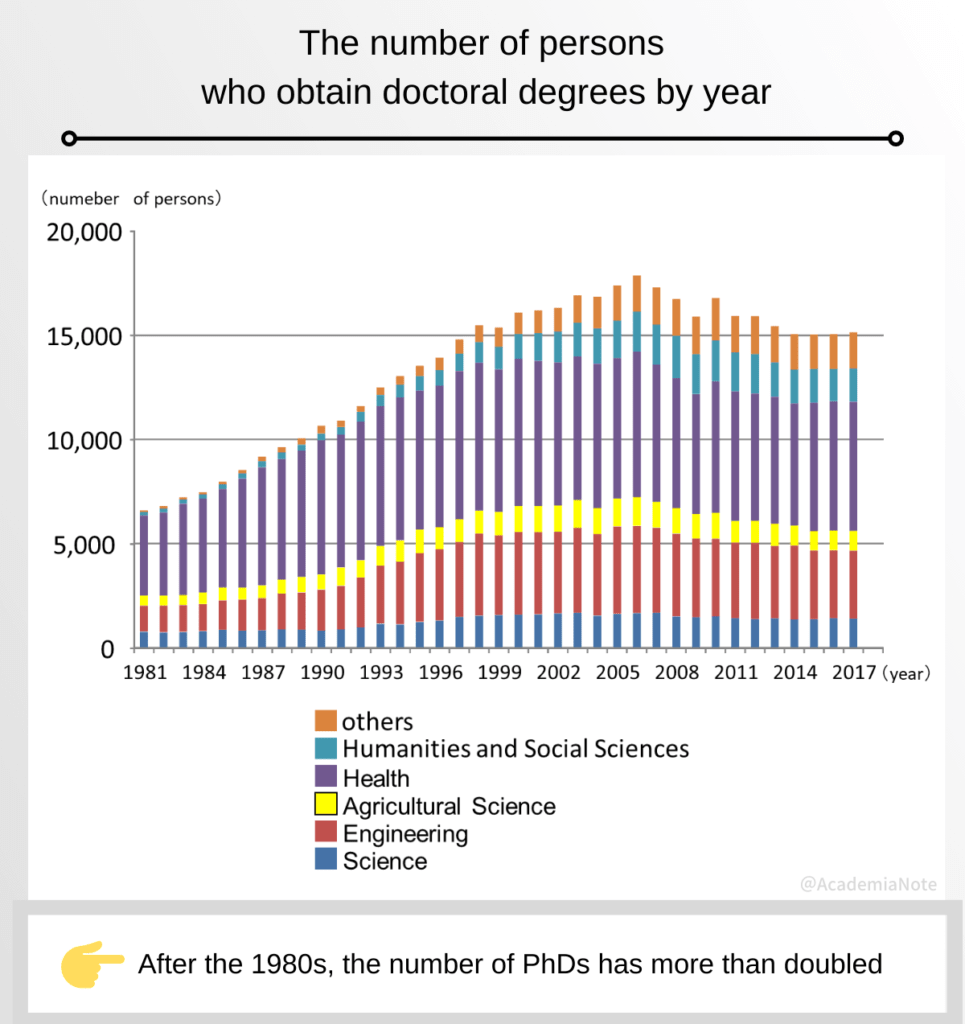
Created using Canva Pro
The number of faculty positions available is not increasing in relation to the number of PhDs.
However, the number of young university faculty members hired has not increased relative to the rapid increase in the number of PhDs.
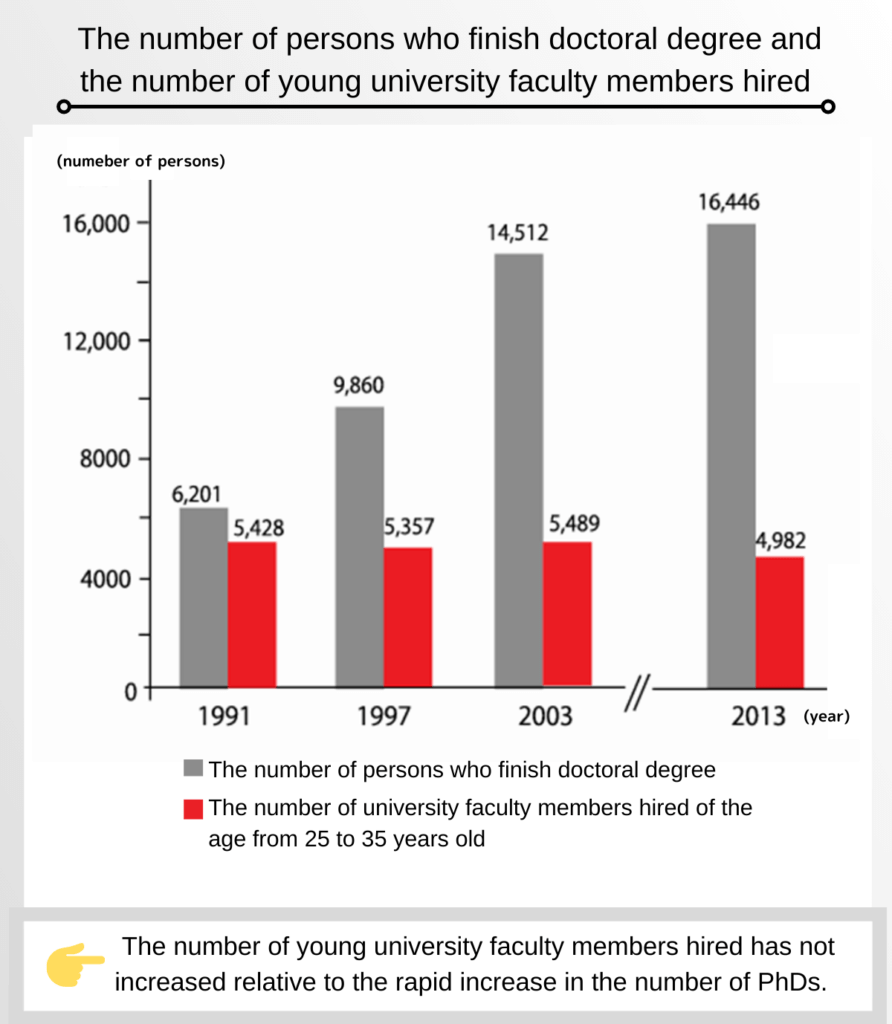
Created using Canva Pro
Because the number of faculty positions is limited, there are often as many as 50 or 100 applicants for a single position.
Thus, the number of postdoctoral fellows has increased as a temporary acceptance for researchers until they obtain a university faculty post.
As a result, only a few new graduates are able to become university faculty members.
The following is the result of a survey conducted by the Ministry of Education, Culture, Sports, Science and Technology on the pre-employment status of those who were hired as university faculty members.
I would like you to note the color is red.
Those who were “newly graduated undergraduates or postgraduates” before being hired are
・10.7% in 2009 (1185 persons)
・8.7% in 2018 (1003 persons)
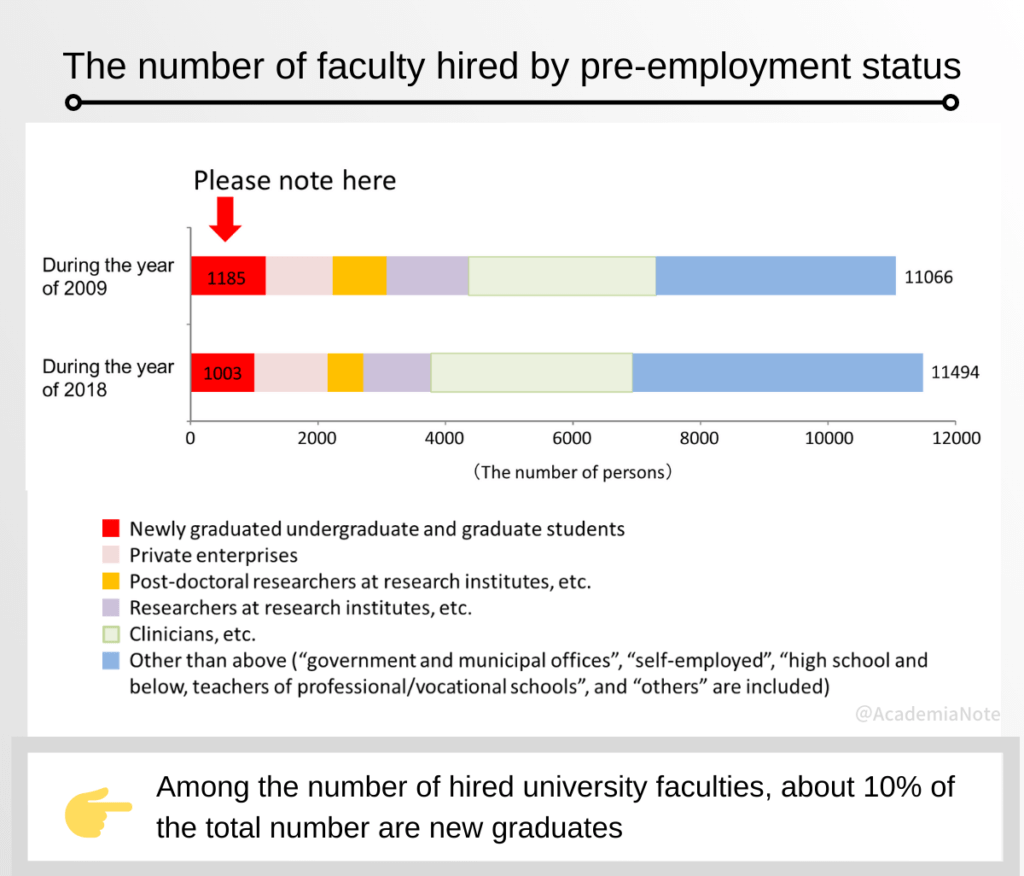
Created using Canva Pro
Reason for difficulty in finding job ②: Increasing number of researchers on fixed-term contracts.
Although university teacher is such a highly competitive position, an increasing number of university teaching positions are now “fixed-term”.
The groups that have seen an increase in “ fixed-term contracts ” positions are in particular are as follows.
・In their 30s and 40s
・Assistant Professor, Specially Appointed Assistant Professor
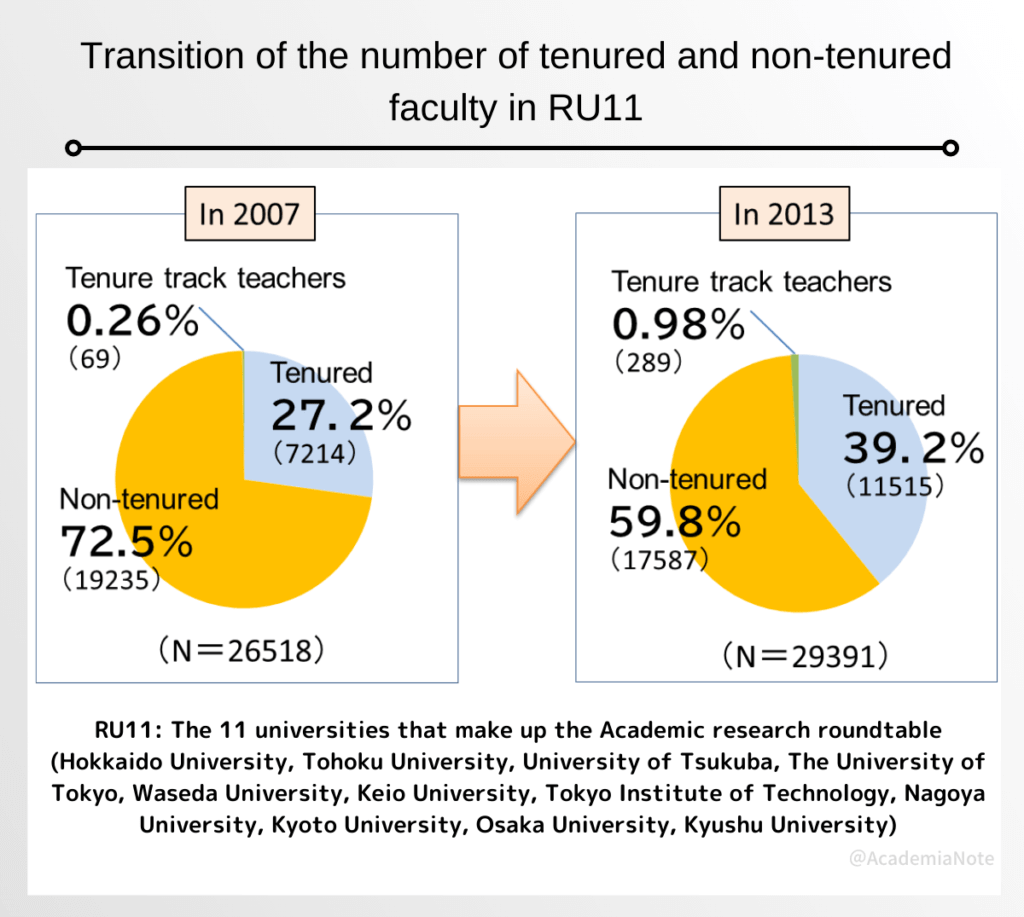
Created using Canva Pro
Even if you win the fierce competition to become a university faculty member, you will have to look for another post if you do not have a tenure.
 あかのん
あかのんIt is even possible to go from postdoctoral fellow to assistant professor to postdoctoral fellow.
The Problem of termination of employment
Researchers (university faculty, postdoctoral fellows, etc.) hired with fixed-term employment in this way, but there are concerns that they will be terminated prior to the 10th year of employment, when they will be able to convert to a permanent position in accordance with the “fixed-term conversion rule” enacted in 2013.
In other words, if the position is a fixed-term position, it has become difficult to work at the same institution for a long period of time while renewing one’s tenure.
About this issue, the scientific journal “Nature” also discussed the problem.
https://www.nature.com/articles/d41586-022-01935-1
Reason for difficulty in finding job ③: Employment in companies is not widespread.
In Japan, it is still not common for doctoral students to find employment in companies, and the idea that “doctoral students become university faculty” is deeply rooted.
Furthermore, until now, companies have not actively hired PhDs.
Compared to other countries, the percentage of PhDs among researchers in companies is very low in Japan.
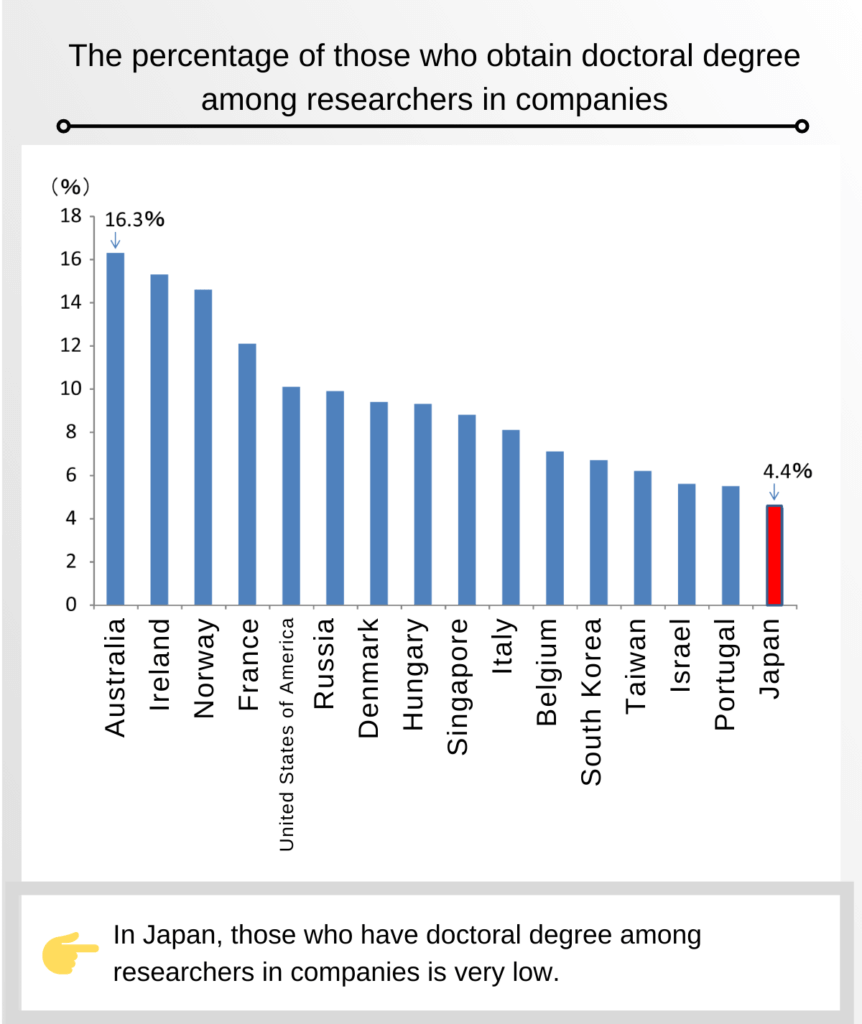
Created using Canva Pro
According to the results of a survey on the status of 2012 doctoral graduates a year and a half later…
・60% of doctoral graduates are employed in academia and 30% in non-academia
・60% in academia are in fixed-term positions, and about 90% in non-academia are in permanent or full-time positions
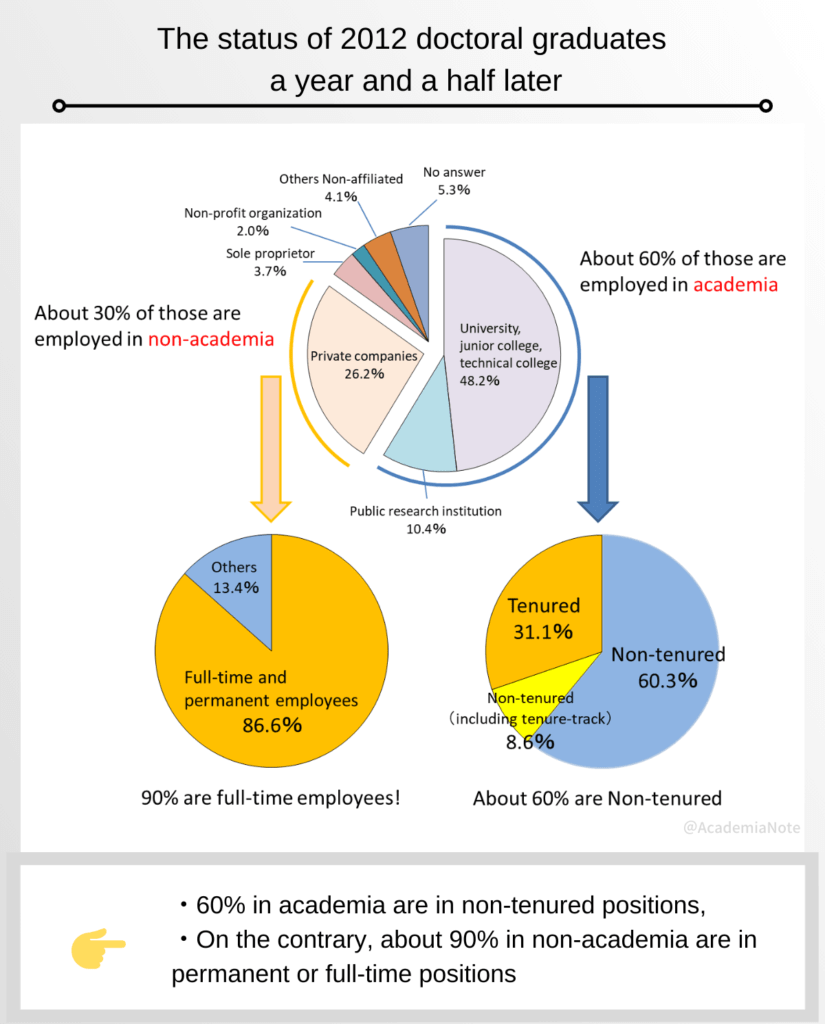
Created using Canva Pro
The main advantage of working for a company is the financial and emotional stability of being a full-time employee.
Recently, there has been a change in corporate job opportunities, with an increase in the number of PhDs in research positions in large companies.
The annual salary of a postdoctoral fellow
How about the treatment and working conditions when you become a postdoctoral fellow in Japan?
Postdoctoral positions come in a variety of forms depending on the university and laboratory, and it is difficult to describe them in general terms, but here is a general introduction, including fixed-term university faculty members.
・Postdoctoral researcher (so-called postdoctoral fellow)
・JSPS research fellow PD
・Fixed-term university faculty
Note on the notation of annual income, etc
In the title, “annual salary” is used to give a general idea, but in the text, “monthly salary” and “annual salary” are used interchangeably to respect the source of the quotation. I would appreciate it if you’d understand that point.
Postdoctoral fellows (Annual salary:3-6 million yen)
Postdoctoral fellows are employed for a fixed term as part of a laboratory’s individual research fund (e.g., Grant-in-Aid for Scientific Research) or a certain project.
There are various forms of postdoctoral fellowships.
A quick look at the current openings shows that the tenure varies from 1 to 10 years, and the salary can be either annual or hourly.
- 250,000 to 500,000 yen/month on an annual salary basis
- 1,500-2,500 yen/hour on an hourly basis
Annual salary can be said to be from top to bottom.
You can find the market rate by checking “Job Title: Researcher/Postdoctoral equivalent” in JrecIn and searching by keywords such as your research field.
The following is an example of a well-known postdoctoral fellow who is publicly advertised.
Example of RIKEN Basic Science Postdoctoral Fellowship
| Treatment | 487,000 yen/month on an annual salary basis (including social insurance premiums and tax), Commuting allowance (actual expense, up to 55,000 yen/month), housing allowance (part of the rent), and travel expenses for relocation (based on the institute’s regulations) are provided. |
| Term | 3years |
 あかのん
あかのんThis is said to be a high salary for a postdoctoral fellow.
Please note that this is not common.
During the postdoctoral fellowship, you will carry out your research in consultation with your employer, professor, etc., and continue to approach tenured positions as you accumulate achievements.
JSPS postdoctoral fellowship PD (Annual salary: approx. 4.5 million yen)
The JSPS postdoctoral fellowship is a system established by the Japanese government to “provide outstanding young researchers in Japan with opportunities to devote themselves to research while independently selecting research themes and other subjects based on their own free ideas” (citation: JSPS website).
In short, it is a government program that provides support for living and research expenses to excellent researchers.
The applicant must be within 5 years of completing the doctoral course. If selected, the researcher can work as a special researcher for 3 years.
・362,000 yen/month is paid directly to the researcher as living expenses
・1.5 million yen/year as research expenses will be paid to the researcher through his/her university.
The number of applicants is very small, approximately 350 in total in the humanities and sciences, and only researchers with innovative research content and sufficient achievements will be accepted.
Assistant professor with fixed term (Annual salary: approx. 6-7 million yen)
The youngest position among university faculty members is the assistant professor, but many assistant professor positions are non-tenured.
“Non-tenured assistant professors” are mainly divided into the following two categories (excluding tenure-track assistant professors)
- Assistant Professor (employed with the university’s basic operating funds)
- Specially Appointed Assistant Professors (employed with external research funds)
There are various types of assistant professors, and their employment status and working styles differ.
According to a survey by the Ministry of Education, Culture, Sports, Science and Technology (MEXT), the monthly salary from the institution to which you belong (this salary only, excluding housing and other allowances and adjustment expenses) is 351,000 yen per month.
For example, if we calculate 20,000/month for housing assistance and other allowances and 3 months’ bonus/year, the annual amount paid by the affiliated university is approximately 5.5 million yen.
In addition, adding additional income from lectures, teaching, writing, etc. at other institutions, the annual income is estimated to be 6-7 million yen
Please refer to the following chart for the difference by university classification.
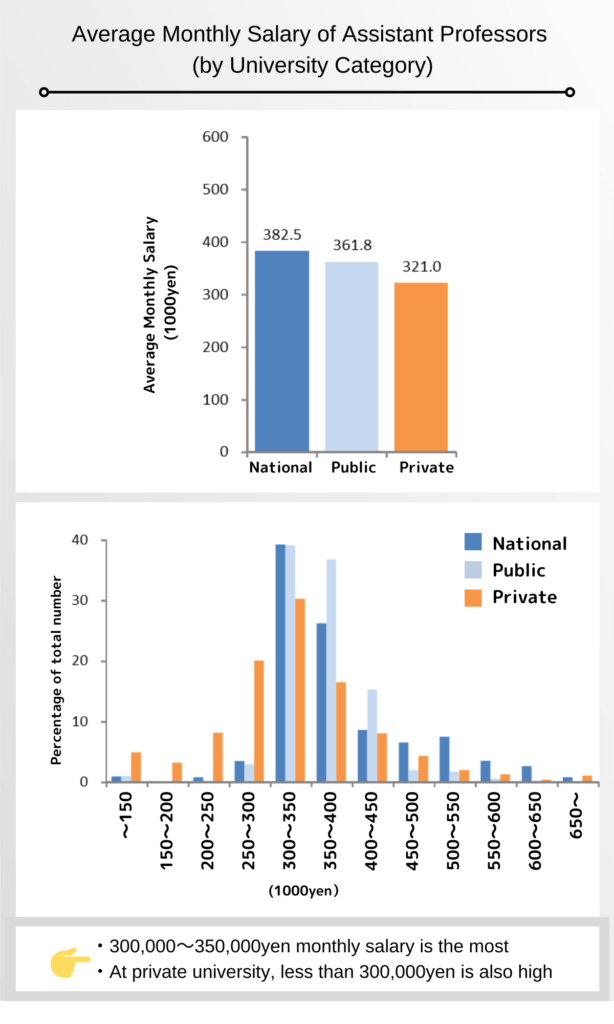
Private faculty members have more varied incomes, but the salary level is not low for university faculty members, even if they are not tenured.
In any case, even if the salary is not less, it is still an unstable situation where one needs to find the next destination before the end of the tenure.
In addition to research, teaching, such as lecturing to students, is also a part of the job.
 あかのん
あかのんAnyway, very hard work! (The administrator has experienced)
What do you think about the postdoctoral fellow problems?
Is postdoctoral fellowship a training period for researchers?
fellowships are becoming regarded as a training period for researchers, a path that anyone can take.
Now that the number of Ph.D. graduates has increased rapidly, the ability of Ph.D. can be said to be “in a class of its own”. (The criteria for awarding Ph.D. degrees vary from university to university, and there are universities and departments where it is easy to obtain a PhDs.)
Is the trend that only postdoctoral fellow who can reliably produce results during their post-doctoral period can obtain tenured university faculty positions is natural in a sense?
The aspect that a laboratory cannot run without postdoctoral fellows
The existence of postdoctoral fellows is so appreciated in the management of a laboratory that “a laboratory cannot run without them”.
Recently, university faculty members spend too much time on teaching and miscellaneous university duties, and are sometimes unable to focus on their research activities. (Student training periods, for example, are often concentrated at certain times of the year, so research is often halted during these periods.)
Under these circumstances, it is not uncommon for postdoctoral fellows to play a major role instead of faculty members in research practices and research guidance for graduate students.
We should not forget that there is an underlying support of postdoctoral fellows in the development of science.
Summary
In this article, I have summarized the employment situation of young researchers in Japan.
The government is taking steps to resolve the critical employment situation of researchers.
The tenure track system, distinguished researcher system, and support for doctoral students are being promoted. I look forward to further progress in this area.
recruitment information : JrecIn

